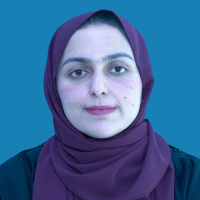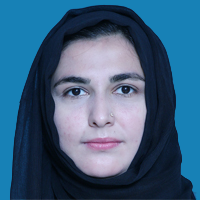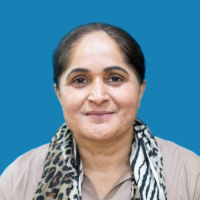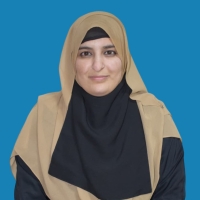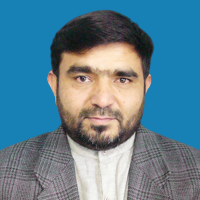
PROFILE SUMMARY
Dr. Ishrat Yousaf received her doctorate in Psychology from the Department of Psychology, University of Peshawar, Pakistan in 2015 and joined academia as a faculty member. Since 2015, she has been appointed as an Assistant Professor and earned 9 years of work experience in multiple Higher education institutions. During this period, she has voluminous contribution to higher education. Since 2019, she has been appointed as an Assistant Professor at the Capital University of Science and Technology. She remained involved in research grants and has been awarded for several research projects as a Principal Investigator, and Co-principal Investigator on competitive merit from Higher Education Commission of Pakistan. She led and work on collaborative research projects in the areas of HIV/AIDS and mental health; contextualizing and developing an adapted e-health intervention for improving care for youth with substance use disorder; and developing indigenous intervention for youth to reduce psychological disorders to prevent and promote mental wellbeing in project as a Co-PI. Dr. Yousaf’s research interests are in the areas of health and clinical Psychology, particularly in the prevention, assessment and intervention of mental health among youth, patients with HIV/AIDS, substance use disorders, and neurodevelopmental disorders.
| QUALIFICATION | |||
| PhD | Psychology | University of Peshawar, Pakistan | 2015 |
| MSc | Clinical Psychology | University of Peshawar, Pakistan | 2003 |
-
TEACHING EXPERIENCE Assistant Professor Capital University of Science and Technology (CUST), Islamabad Since – 2019 Assistant Professor Foundation University Rawalpindi Campus, Islamabad 2019 – 2019 Assistant Professor Iqra University Islamabad 2016 – 2018 Assistant Professor Fatima Jinnah Women University, Rawalpindi 2015 – 2016 MEMBERSHIP OF PROFESSIONAL BODIES APA Member American Psychological Association (2022 – 2023) RESEARCH AREAS / INTERESTS 1. HIV/AIDS 2. Health 3. Suicide Prevention, Assessment and Intervention 4. Clinical Psychology RESEARCH SUPERVISION 1. MS Impact of Perceived Ease of Use and Perceived Usefulness of Enterprise Resource Planning, System adoption on End User Acceptance 2. BS Personality traits as predictors of Internet Addiction and procrastination among University Students 3. BS Role of Self-efficacy, Impostor Phenomenon and Career Aspiration of University Students 4. BS Association between Screen Time, Green Time with Psychological Wellbeing and academic Performance among University Students 5. BS Psychometric evaluation of the Urdu Translated Version of Anxiety Scale for Children with Autism Spectrum Disorder 6. BS Association between Tobacco smoking, Mental Health Problems, and Demographic Characteristics of Unemployed University Graduates 7. BS Impact of Problematic Use of smartphone on Behavioral Problems and Quality of Life of Adolescents 8. BS Association between self-efficacy, Resilience, and Psychological Wellbeing among Adolescents 9. BS Internet Addiction, Emotional Instability and academic performance among Adolescents 10. BS Association between Cyberbullying Victimization, Anxiety, Depression and Self-Esteem among University Students 11. BS Social media addiction as a risk factor for psychological distress, anxiety and depression among adolescents 12. BS Relationship between Pet Attachment, Pet Bereavement, and Mental Health (Stress, Anxiety and Depression) among Pet Owners 13. BS Association between Instagram Addiction, Quality of Peer Relationship, and social Anxiety among Youth 14. BS Relationship between social support, Mental wellbeing and Work Life Balance among Working Women SR. JOURNAL PUBLICATIONS YEAR 1 S. Haqqani, M. N. U. Sabahat, M. T. Fatima, M. M. Khan, and I. Yousaf, “Indigenous conceptualization of depression and anxiety: FGDS with pakistani youth and health practitioners,” Kurdish Studies, vol. 12, no. 4, pp. 997–1008, 2024.
2024 2 S. Haqqani, M. T. Fatima, M. N. U. Sabahat, M. M. Naeem, N. Khan, and I. Yousaf, “Development of wellness guide: A guided self-help indigenous intervention for reducing depression, and anxiety and enhancing wellbeing of pakistani youth,” Kurdish Studies, vol. 12, no. 4, pp. 699–707, 2024. 2024 3 D. Haqqani, M. Naeem, T. Fatima, N. Sabahat, and I. Yousaf, “Depression,anxiety, stress and wellbeing of young psychology students in pakistan: Across-sectional descriptive study,” Migration Letters, vol. 21, no. S10, pp.
100–108, 05 2024.2024 4 D. I. Yousaf, D. S. Perwez, and D. S. . Rahim, “Association Between Cyberbullying Victimization, Anxiety, Depression And Self-Esteem Among University Students”, Migrat. Lett., vol. 21, no. S8, pp. 282–291, 2024.
2024 5 S. Parwez, S. Khurshid, and I. Yousaf, “Impact of procrastination on self-esteem of college and university students of khyber pakhtunkhwa,” Multicultural Education, vol. 9, no. 4, pp. 34-41, 2023.
2023
6 B. Naeem, M. Aqeel, A. Maqsood, I. Yousaf, and S. Ehsan, “Psychometric properties of the revised urdu version dyadic adjustment scale for evaluating marital relationship quality between madrassa and non-madrassa married women,” International journal of human rights in healthcare, vol. 16, no. 1, pp. 34–53, 2023.
2023
7 I. Yousaf and S. Haqqani, “Hiv treatment adherence self-efficacy scale for pakistani hiv/aids patients: Translation and psychometric evaluation,” Applied Nursing Research, vol. 66, p. 151606, 2022. 2022 8 M. Aqeel, J. Abbas, K. H. Shuja, T. Rehna, A. Ziapour, I. Yousaf, and T. Karamat, “The influence of illness perception, anxiety and depression disorders on students mental health during covid-19 outbreak in pakistan: a web-based cross-sectional survey,” International Journal of Human Rights in Healthcare, vol. 15, no. 1, pp. 17–30, 2022.
2022 9 S. Zaman, D. Arouj, S. Irfan, and I. Yousaf, “Maladaptive schema modes as the predictor of post-traumatic stress disorder among trauma survivors,” Journal of the Pakistan Medical Association, vol. 71, no. 7, pp. 1789-1792, 2021 2021 10 I. Rizwan and E. Irshad, “Suicide risk among individuals with HIV/AIDS.” Bahria Journal of Professional Psychology, vol. 14, no. 1, p. 1, 2015. 2015 11 I. Rizwan and E. Irshad, “Post-traumatic stress disorder and depression among patients suffering from HIV/AIDS,” Dialogue, vol. 7, no. 4, pp. 393–414, 2012. 2012 12 I. Yousaf, M. Khan, S. Haqqani, and M. Saba, “Anxiety scale for children with autism spectrum disorders: Translation, cross-cultural adaptation and psychometric evaluation,” Research in Autism, vol. 123, p. 202548, 2025 2025 SR. CONFERENCE PUBLICATIONS YEAR 1 I. Yousaf and S. Haqqani, “Indigenous conceptualization of depression and anxiety: FGDs with Pakistani youth and health practitioners,” in 3rd International Social Sciences Congress, 2024 2024 2 S. Haqqani and I. Yousaf, “Development & Evaluation of Wellness Guide: A Self-Help Indigenous Intervention for Reducing Depression and Anxiety and Enhancing Wellbeing of Pakistani Youth” Third International Social Science Congress held on May 17 -19, 2024, Kas, Turkey 2024 3 I. Yousaf and M. Qaiser, “Negative self-beliefs as a barrier towards career aspirations,” in 2nd National Home Economics Conference: Home Economics: Expanding New Horizons, 2017.
2017 4 I. Rizwan and E. Irshad, “Anxiety and social functioning among individuals with HIV and AIDS,” in 74th ICP, Inc. Conference: Annual Scientific Conference & Board Meetings, Yokohama, Japan, 2016. 2016

